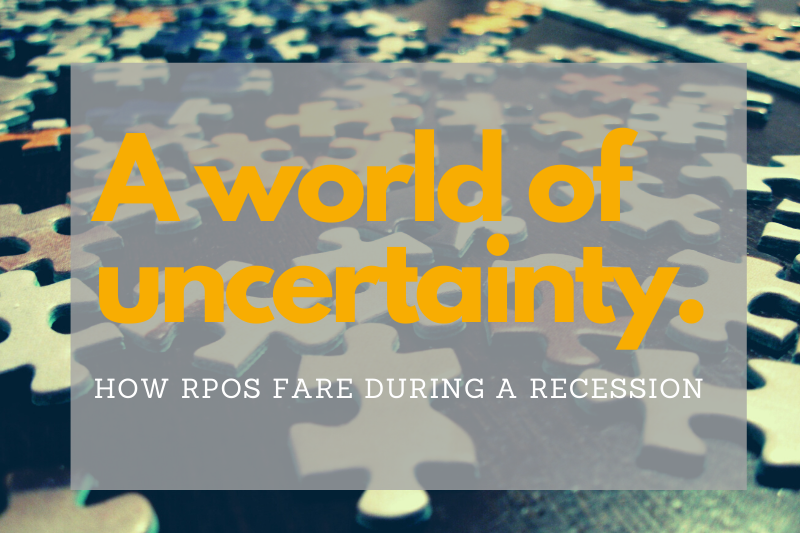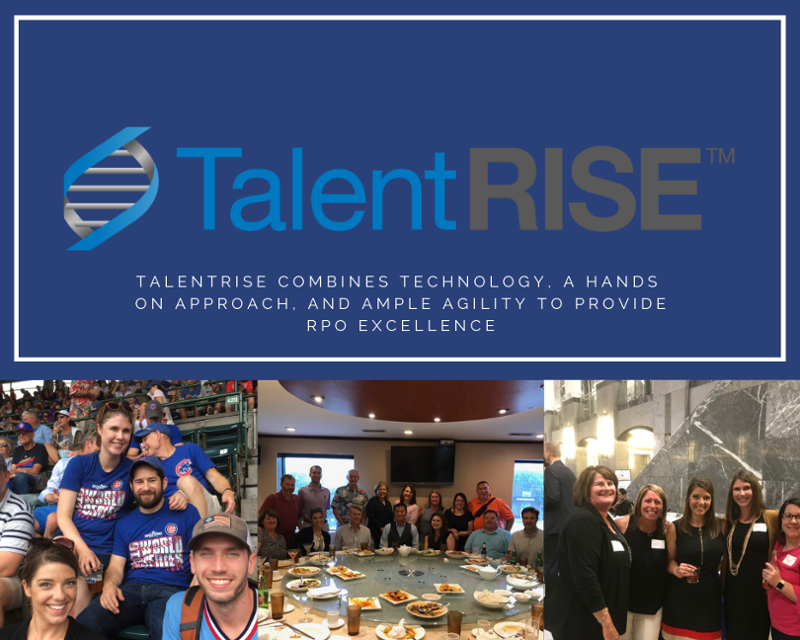
RPOA: How is the coronavirus pandemic disrupting your work at an individual level and at an organizational level?
Zach: My line of work is fortunate enough that it can be done almost anywhere there is a computer and good internet connection. While I miss the direct collaboration with the sales team in the office, going through my last surgery on the spur of the moment was a bigger disruptor to my personal work environment.
At an organizational level, however, losing instant collaboration is making us realize how much we really do take it for granted. My research content pipeline shifts a bit slower in response to sales movements because I am not in the room with the team. Similarly, much of the fragile elements I began to work shoring up before this all happened are exposing some of their weaknesses in terms of how we are able to strategically and nimbly partner between departments on accounts.
On the bright side, the slowdown means it is a good time to look at our [Aberdeen] products and services and find ways to improve them. The downside is that slower communications delay possible opportunities. When hunkering down is a business strategy, talent planning is also limited as the company is not as sure where its next growth phase will come from.
Adding in government-provoked market uncertainty and we are all pretty much in the doldrums with no one sure of the right move to make an investment anywhere in their firms.
RPOA: How are you adjusting to these new (and hopefully short-term) challenges?First, the level to which the virus has spread is leaving many people angry because there was no need for it to get to this level – while South Korea is in a technical state of war making it easier for them to pivot to a strategy of shoring up their population through central government activity, they have proven that getting testing out with strict confinement measures can stanch the flow of the virus while providing accurate information within a small percentile of the actual likely infection count.
The root of our biggest challenge, as with everyone else, is not knowing how long this will last because there is no uniform response let alone one that invokes any sense of planning. Even in Quebec, the province is closing down with fewer than 100 confirmed cases but they are taking measures to push stimulus to the public who will be out of work or under hardship based on personal need and not economic stability. The province is also putting in an action plan based on count numbers that stipulate what will happen when certain thresholds are hit. No state or city down here has done that and lockdown measures are inconsistent or unclear. Here in MA, for example, the arbitrary limit of gatherings to under 25 people should have been a per square foot limit with an exception for grocery stores, pharmacies, and mixed-use stores selling vital supplies (Target, Costco, etc.). The Governor took hasty action after waiting too long and his order left things too vague.
The reason for starting this question this way is that it sets the tone for the fact that there is no way to adjust to this strategically. I have been trying to convince my firm not to overact and contract too much. Fortunately, our chairman is bullish on us handling our clients with empathy and helping become strategy partners with them to navigate their efforts to reinforce their own customers, chart new ones, and support whatever efforts they are making to improve community services, such as free online education services during school closures. The rest of what we are doing is largely focused on shoring up company-wide communications.
Personally, I saw an opportunity to work with chief innovation officer on some new initiatives while things are in flux to try and help us streamline our offerings in support of the best customer engagement possible. Net of everything, all we can do is go one day at a time, minimize our cost footprint on the firm, and try to be as innovative as possible to help keep the system moving.

RPOA: What're your predictions for the unemployment numbers over the next few months?
The market is a funny thing, although right now I’m sure a lot of people aren’t laughing. The current downturn is event-based and unrelated to any faltering underlying economic mechanism per se. In 2008-09, the mortgage crisis was caused by bad lending practices that depended on deregulation and the subsequent selling of bad debt in the market to the same people who were presumably already under water in terms of their current debt structures – an economic mechanism problem that only good regulation and restructured taxes would resolve and reset, both of which never really happened thus widening the economic inequality gap.
The market today is responding to the uncertainty about the response to the virus that impacts the flow of goods and services – a mercantile problem. Consequently, if the virus is treatable by year-end, I am confident things will improve enough to limit the economic fallout such that we will not be stuck with a 1987 situation but more of a short- to medium-term recession scenario. Unemployment will tick up but unevenly given the state of industrial concentrations in the US to date. Markets that recovered first after 08-09 will be more stable than those that started to recover 10 years later.
The reason is that the first wave became corporate centers while the second wave served as tier 2 expansion markets as companies could leverage cheap debt to expand their footprints. Regardless, unemployment should tick up at least in the short-term but I am not so sure it will rise by as much as 20% as stated as a possibility by Powell. What will determine the uptick and its duration are a few factors, some of which RPO is in a good position to resolve:
- The Non-Starter: Zero or negative interest rates will make it easier for corporations to leverage even cheaper debt to continue operations. The one limiting factor here is that many large organizations are already maxed out in terms of their leverage to take on more debt. To resolve this they will either need to raise more capital in the market, find new investors, or grow new revenue. An uptick in unemployment coupled with a lack of a middle class consumer going into the virus crisis means new revenue will be difficult – that leaves M&A as a way to gain more cash and reserves to leverage out for the cheap debt but M&A almost always causes more unemployment, not less so hiring activity that follows may simply zero out the added unemployment of M&A.
- The R&D Problem: Companies may finally see a need to spend some of their case on real R&D that looks at the long term. Real R&D will make job skills requirements shallower and broader thereby widening talent pools and giving more people an opportunity to get back to work with less formal training or retraining. Unless corporate leadership changes in the months following virus recovery, however, I don’t see a return to long-term planning on the immediate horizon. While the R&D fix is the ideal outcome to make all boats rise and get the market moving, I don’t see this happening as it requires behavioral change amongst corporate leaders.
- The Talent Problem: The talent problem goes beyond getting the right people to the right place at the right time. The talent problem is also a talent tools problem in that many organizational TA strategies are not aligned to the tools being used to support them. Consequently, many qualified candidates get weeded out of the TA process in screening because the protocols for a candidate match are too rigid or keyword dependent that gamifying the ATS is too difficult and inconsistent from firm to firm. Not only is it difficult for employers to find the right talent, but it is increasingly difficult for would-be employees to make it through the automated hiring process, qualified or not. RPOs have huge asset value here to keep talent pools as wide as they can be by essentially giving employers a wake-up call about rigidity in talent selection criteria especially for requirements like needing to have experience with a specific software – employers should train incoming staff on it, not require it.
- The Government Effort: We are in an election year where anything can still happen. The virus looks to be sinking opportunities for conservatives because logic and basic instinct led many to know that liberal and expansionist action was needed in response to such an event – that does not mean that conservative support has dried up but it does mean that values have shifted somewhat. Any effort by the government to shore up the economy and prevent massive unemployment will need to focus on how to provide a solid foundation to workers who have no defined benefits or protections. Businesses have gotten away with selling a large portion of the workforce on temp, part-time, full-time hourly, and contingent work styles. Economically, there was no reason for employers to do this but for short-term cost cutting that lined the pockets of the c-suite. Short-term cutting like this is now coming to bite firms who will lose their consumers to rent and food as these employees lose their wages in a company shutdown. The sooner the government protects these people from evictions, from money-based food shortages, from childcare issues, etc., the better off the market will be and the better off unemployment will be on the back end – pay now or pay later. Furthermore, any cash injections must not focus on the market and instead must focus on personal need.
As with business outlook, unemployment will depend on the response to the near shutdown of global supply chains. Right now, I am at work on a research project valuing localized, demand-based production and distribution with an emphasis on global capital investment flows. The virus gave me another angle to promote this structure for globalism as being more responsible because it reduces the risk of whole supply-chain shutdowns in the wake of large-scale events. Avoiding these keeps the market moving and provides better for stability.
Nevertheless, unemployment will go up to some degree – the magnitude depends on the response. To minimize it, drastic action is needed by businesses and responsible action by the government – and a payroll tax cut is the last thing we need as trickle-down economics does not work.
RPOA: How would these economic conditions affect your clients and affect your organization?There will be a lot of new opportunities in HCM emerging out of this. Leading the charge is the future fusion of ERP, financial planning, and HCM into organizational performance management (OPM), which we are charting more and more these days. OPM provides real-time data across all corporate divisions at once in a way that fosters cross-team collaboration on organizational initiatives to keep whole teams moving regardless of where anyone is located at any given time.
I have a sense that OPM and the fusion of talent acquisition and performance into continuous talent placement will be big topics in the coming years. Right now, many clients are shoring up their online outreach presences in response to their loss of events. For the RPOA, this may be a great time to gain industry partners who are looking for broader appeal. For us, the same goes.
There is a lot of uncertainty right now, but uncertainty always yields opportunities if we can see them.













